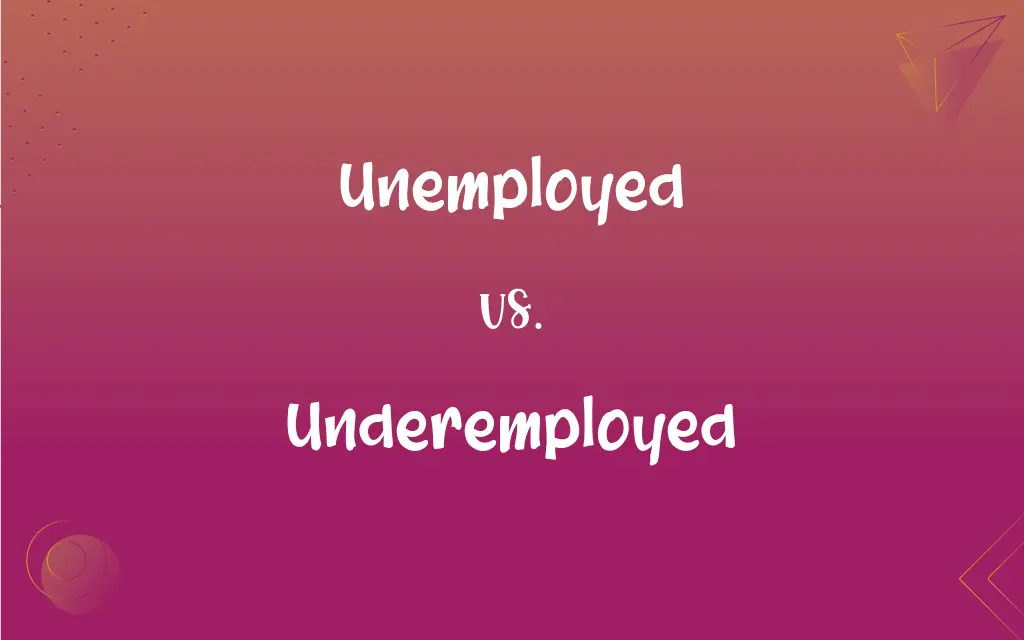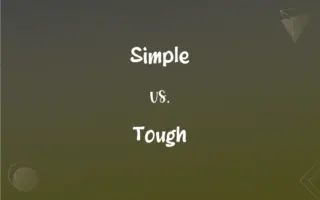Unemployed vs. Underemployed: What's the Difference?
Edited by Harlon Moss || By Janet White || Published on November 20, 2023
Unemployed means having no job and seeking work; underemployed refers to working below one's skill level or having fewer hours than desired.

Key Differences
Unemployed and underemployed are terms that refer to different employment states, both reflecting challenges faced by individuals in the workforce. When someone is unemployed, it means they do not have a job, but they are actively seeking employment. On the other hand, underemployed individuals have jobs, but these roles may not utilize their full skills, qualifications, or experience.
The economic implications of both unemployed and underemployed individuals are significant. An unemployed person might be reliant on unemployment benefits or personal savings, facing financial hardships until they find a new job. Meanwhile, underemployed persons might be earning a wage, but it might not be commensurate with their qualifications, leading to potential financial strains.
From a societal perspective, high levels of unemployed individuals can indicate economic downturns, recessions, or issues with job creation in specific sectors. High underemployment suggests that while jobs are available, they might not be of the quality or quantity to meet the needs of the educated or skilled workforce, indicating potential mismatches between education, training, and job opportunities.
On a personal level, being unemployed can be emotionally challenging, often tied to feelings of inadequacy or concerns about financial stability. Being underemployed, while providing some financial relief, can lead to feelings of frustration or unfulfillment, especially if the individual feels they are not reaching their potential or are being under-compensated for their skills.
Comparison Chart
Definition
Without a job and actively seeking one.
Employed in a job below one's skills or with fewer hours than desired.
ADVERTISEMENT
Economic Impact
Reliance on unemployment benefits or savings.
Earning, but potentially below potential or desired income.
Indication
Economic downturns or sector-specific issues.
Mismatch between job opportunities and workforce skills/education.
Emotional Impact
Potential feelings of inadequacy or financial stress.
Feelings of frustration, unfulfillment, or being under-compensated.
Duration
Can be short-term or long-term.
Can persist if skills/qualifications are not matched to available jobs.
Unemployed and Underemployed Definitions
Unemployed
Without work but seeking employment.
After the factory closed, many were left unemployed.
ADVERTISEMENT
Underemployed
Working below one's skill level or potential.
The engineer, unable to find a job in his field, felt underemployed working in retail.
Unemployed
Not currently holding a paying job.
Lisa has been unemployed for three months now.
Underemployed
Having a job that doesn't utilize one's qualifications.
Many graduates find themselves underemployed in today's market.
Unemployed
Free from employment obligations.
After his contract ended, he remained unemployed for a while.
Underemployed
Employed with insufficient hours.
As a part-time worker wanting full-time hours, she was underemployed.
Unemployed
Lacking a job despite the desire to work.
The recession caused many to become unemployed.
Underemployed
Earning less than one's qualifications would suggest.
His doctorate degree seemed wasted as he was underemployed in a clerical position.
Unemployed
Not engaged in a gainful occupation.
He's been unemployed since he left college.
Underemployed
Occupationally mismatched with employment.
The artist felt underemployed in the data entry role.
Unemployed
Out of work, especially involuntarily; jobless.
Underemployed
Employed only part-time when one needs and desires full-time employment.
Unemployed
Not being used; idle.
Underemployed
Employed at a low-paying job that requires less skill or training than one possesses.
Unemployed
People who are involuntarily out of work considered as a group. Used with the.
Underemployed
Underemployed persons considered as a group. Used with the.
Unemployed
Having no job despite being able and willing to work.
The government announced a new initiative to help the unemployed.
Underemployed
Employed in a job that offers fewer work hours than desired.
I found myself underemployed when the company downgraded me from full-time to part-time.
Unemployed
Having no use, not doing work
Underemployed
Employed only part-time when one needs full-time employment or not making full use of your skills;
Migrants are likely to be poor and underemployed
Able people are kept underemployed
Unemployed
Not employed in manual or other labor; having no regular work.
Unemployed
Not invested or used; as, unemployed capital.
Unemployed
Actively seeking employment but unable to find a suitable job.
Unemployed
Not engaged in a gainful occupation;
Unemployed workers marched on the capital
FAQs
What does underemployed mean in the job market?
Underemployed means working in jobs below one's skills or not getting enough work hours.
How is unemployed defined in statistical terms?
Unemployed typically refers to those without a job but actively seeking employment.
What causes underemployment in educated individuals?
Mismatches between available jobs and education or skills can lead to underemployment.
Are unemployment benefits available for the underemployed?
Depending on the region, underemployed individuals might receive partial benefits.
How can an unemployed person transition to employment?
Networking, skill development, and persistent job-seeking can help in transitioning.
How can one avoid underemployment after graduation?
Pursuing internships, networking, and continuous learning can help mitigate underemployment risks.
Is underemployment always negative?
While often seen negatively, some choose underemployment for flexibility or work-life balance.
Can someone be both unemployed and underemployed?
No, one can either be unemployed (without a job) or underemployed (with a suboptimal job), not both simultaneously.
How does unemployment affect the economy?
High unemployment can reduce consumer spending, affecting economic growth.
How do recessions impact unemployed and underemployed rates?
Recessions often increase both unemployment and underemployment due to economic slowdowns.
What's the societal impact of widespread underemployment?
Widespread underemployment can signal economic inefficiencies and potential talent wastage.
Is there a stigma associated with being unemployed or underemployed?
Some cultures or societies might stigmatize unemployment or underemployment, associating them with inefficiency or lack of ambition.
Do unemployment rates account for the underemployed?
No, unemployment rates only account for those without jobs but actively seeking work.
What is the difference between long-term and short-term unemployment?
Long-term refers to prolonged periods without a job, while short-term is temporary joblessness.
Can one be underemployed by choice?
Yes, some choose underemployment for personal reasons, like pursuing a passion or balancing family needs.
How is the mental well-being of unemployed individuals affected?
Unemployment can lead to stress, anxiety, or feelings of inadequacy.
Do underemployed people have career growth opportunities?
While currently underutilized, they can seek opportunities or training to achieve career growth.
Are freelancers considered underemployed?
Not necessarily. Freelancers might work full-time hours or prefer the flexibility of part-time.
How do governments address high unemployment rates?
Job creation, skill training programs, and economic stimuli can help reduce unemployment.
Is it easy to transition from underemployment to full employment?
It varies based on individual skills, market demand, and networking efforts.
About Author
Written by
Janet WhiteJanet White has been an esteemed writer and blogger for Difference Wiki. Holding a Master's degree in Science and Medical Journalism from the prestigious Boston University, she has consistently demonstrated her expertise and passion for her field. When she's not immersed in her work, Janet relishes her time exercising, delving into a good book, and cherishing moments with friends and family.
Edited by
Harlon MossHarlon is a seasoned quality moderator and accomplished content writer for Difference Wiki. An alumnus of the prestigious University of California, he earned his degree in Computer Science. Leveraging his academic background, Harlon brings a meticulous and informed perspective to his work, ensuring content accuracy and excellence.







































































